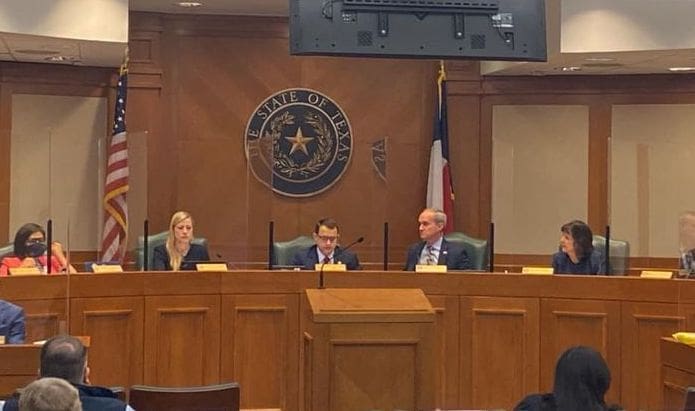UPDATED April 22 to add two priority bills reported to House Calendars.
As the Texas Legislature moves through week 15 of the 20-week session, the Republican-controlled state House has passed just one election integrity bill identified as a legislative priority by grassroots activists in the Republican Party of Texas.
Meanwhile, RPT-priority House bills continue to be heard in the House Elections Committee, which has yet to take up any Senate bills.
Election integrity is a top legislative priority of the Texas GOP and the only one also declared an emergency item by Republican Gov. Greg Abbott, back on February 1. Emergency status allows lawmakers to act on bills in the first 60 days of the session, when legislative activity is otherwise limited to bill filing and committee hearings.
But that fast-track status was squandered. State Rep. Briscoe Cain (R–Deer Park) was appointed to chair the House Elections Committee on February 4, but the House failed to move any priority election bills before March 12—though the Elections Committee has now heard more than 80 bills, including 13 of 16 House bills identified by the RPT as meeting their election integrity legislation goals.
On Wednesday, the House Elections Committee heard 13 new bills, including two that meet the RPT’s election integrity goals:
- House Bill 2339 by State Rep. Stephanie Klick (R–Fort Worth) is a voter roll cleanup bill that directs the attorney general to regularly compare voter rolls to lists of self-identified noncitizens and nonresidents excused from jury duty. HB 2339 is a companion to Senate Bill 155, which was passed by the Senate on April 6 and referred to the House Elections Committee on April 12.
- House Bill 4044 by Cain authorizes the secretary of state to withhold funding from county election officials who fail to follow rules for canceling registrations of ineligible voters. HB 4044 is similar to Senate Bill 1113, which passed the Senate on April 12 and was referred to the House Elections Committee on April 14.
Elections Committee members also voted Wednesday to advance more than 20 bills, including RPT-priority House Bills 2339, 3297, 4369, and 4044.
Once passed out of committee, House bills are sent to the Calendars Committee, whose members decide when (or if) each bill will be placed on the House calendar to be considered by the full chamber in the order in which they are received.
If bills get placed on the calendar in time, members will have an opportunity to debate and amend the legislation on the House floor. After two separate votes to pass the bills, they are then sent to the Senate to repeat the process.
With fewer than 40 days left in the legislative session, the House has passed only one RPT-priority election integrity measure, House Bill 574, which increases the penalty for election fraud from a misdemeanor to a second-degree felony.
House Bill 6, the lower chamber’s top-priority comprehensive “omnibus” bill, was passed out of committee on a party-line vote on April 8, but Cain’s committee substitute (a revised version of the bill) has yet to be sent to Calendars.
As of Thursday, six election integrity bills are awaiting action by Calendars, including two RPT priorities:
- House Bill 2478 requires voters to include a voter ID number on their vote-by-mail applications and ballots.
- House Bill 2546 directs the secretary of state to enforce local registrars’ voter roll maintenance duties and adds a criminal penalty for officials who repeatedly fail to comply.
The Senate has passed five of six election reforms designated RPT priorities, including top-tier election integrity omnibus Senate Bill 7 and Senate Bills 155, 598, 1113, and 1234.
All five are awaiting a hearing in the House Elections Committee, along with other Senate bills to make voting more secure.
On Monday, the Senate State Affairs Committee heard five new election reform bills, plus two proposed constitutional amendments related to election integrity.
Texas Scorecard is tracking the progress of key election integrity bills as they move through the Legislature.
Bill details and other resources to help citizens participate in the legislative process are available at Texas Legislature Online.





